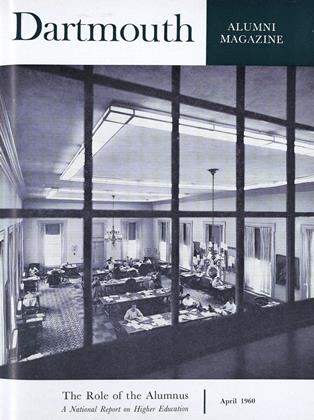ByAndrew M. Scott '45. New York: Rinehart,1959. 668 pp. $8.50.
In Political Thought in America, Andrew M. Scott, Associate Professor of Political Science at the University of North Carolina, has compiled an admirable collection of the major works which constitute our basic political heritage. While designed primarily for use in the college classroom, this book should be of very real interest to anyone who wants to gain a more complete understanding of the political origins and development of the United States.
At the outset, Professor Scott makes his purpose clear - to concentrate on major figures and major movements in order to present a broad concept of the American political tradition. In keeping with this objective, the book first follows an historical format, tracing our leading social and political writers from early Puritan days through the Progressive Era. The final chapters then concentrate on some basic problem areas of a more contemporary nature - pressure groups, parties, and the political process; the New Deal; and present currents in American social and political thought.
Hence, we are confronted with a representative sampling of the writings of the early New England spokesmen - Cotton, Win-throp, Williams; the molders of the new nation - Paine, Hamilton, Jefferson, Adams, Madison, Marshall; the nineteenth century giants - Webster, Jackson, Calhoun, Lincoln; and finally representatives of more recent times - Woodrow Wilson, Herbert Hoover, Franklin D. Roosevelt, John Dewey, and Reinhold Neibuhr, to name a few.
This is not, of course, the first compilation of American political theory, and each particular approach to this subject, of necessity, must represent a compromise between emphasis on interpretation by the editor and emphasis on the original writings themselves. In the present instance, Professor Scott presents the reader with a series of lucid background summaries which serve as general introductions to the particular historical or topical writings which are included under the various chapter headings. Then, wisely, he lets the original authors speak for themselves and offers the reader a solid, substantial fare of the great works which make up America's political tradition.
Of particular interest to Dartmouth readers is the fact that the book is dedicated to Donald Harvard Morrison, "teacher, educational statesman, and friend." I can think of no finer tribute to the College's late Provost, nor can I recommend a more worthwhile collection of writings for the consideration of any Dartmouth reader - undergraduate or graduate - who is interested in acquiring a more meaningful understanding of the basic political concepts that have gone into the making of modern America.
 View Full Issue
View Full Issue
More From This Issue
-
 Feature
FeatureThe TPC Planning Program
April 1960 By FRANK SMALLWOOD '51 -
 Feature
FeatureEverything But Little Dogies
April 1960 By WARREN BLACKSTONE '62, PETE BOSTWICK '63 -
 Feature
FeatureTHE ALUMNUS/A
April 1960 -
 Article
ArticleWinter Sports
April 1960 By CLIFF JORDAN '45 -
 Article
ArticleTHE COLLEGE
April 1960 -
 Class Notes
Class Notes1951
April 1960 By LOYE W. MILLER, JAMES V. ROBINSON
FRANK SMALLWOOD '51
-
 Feature
FeatureThe TPC Planning Program
April 1960 By FRANK SMALLWOOD '51 -
 Books
Books1600 PENNSYLVANIA AVENUE.
July 1960 By FRANK SMALLWOOD '51 -
 Books
BooksTHE FEDERAL BULLDOZER – A CRITICAL ANALYSIS OF URBAN RENEWAL, 1949-1962.
FEBRUARY 1965 By FRANK SMALLWOOD '51 -
 Books
BooksTHE MAKING OF URBAN AMERICA
JULY 1965 By FRANK SMALLWOOD '51 -
 Books
BooksTHE ZONING GAME: MUNICIPAL PRACTICES AND POLICIES.
FEBRUARY 1967 By FRANK SMALLWOOD '51 -
 Books
BooksTHE POLITICS OF POLLUTION.
NOVEMBER 1970 By FRANK SMALLWOOD '51
Books
-
 Books
BooksAlumni Articles
MARCH 1966 -
 Books
BooksShelf Life
Mar/Apr 2003 -
 Books
BooksHOW TO WRITE A MOVIE
January 1937 By Ernest Bradlee Watson '02 -
 Books
BooksTHE HAPPY END
June 1939 By H. G. R. -
 Books
BooksPRINCIPLES OF GEO CHEMICAL PROSPECTING.
November 1957 By JOHN B. LYONS -
 Books
BooksAT THE SIGN OF THE GOLDEN COMPASS
October 1938 By RAY NASH.

